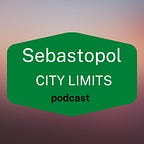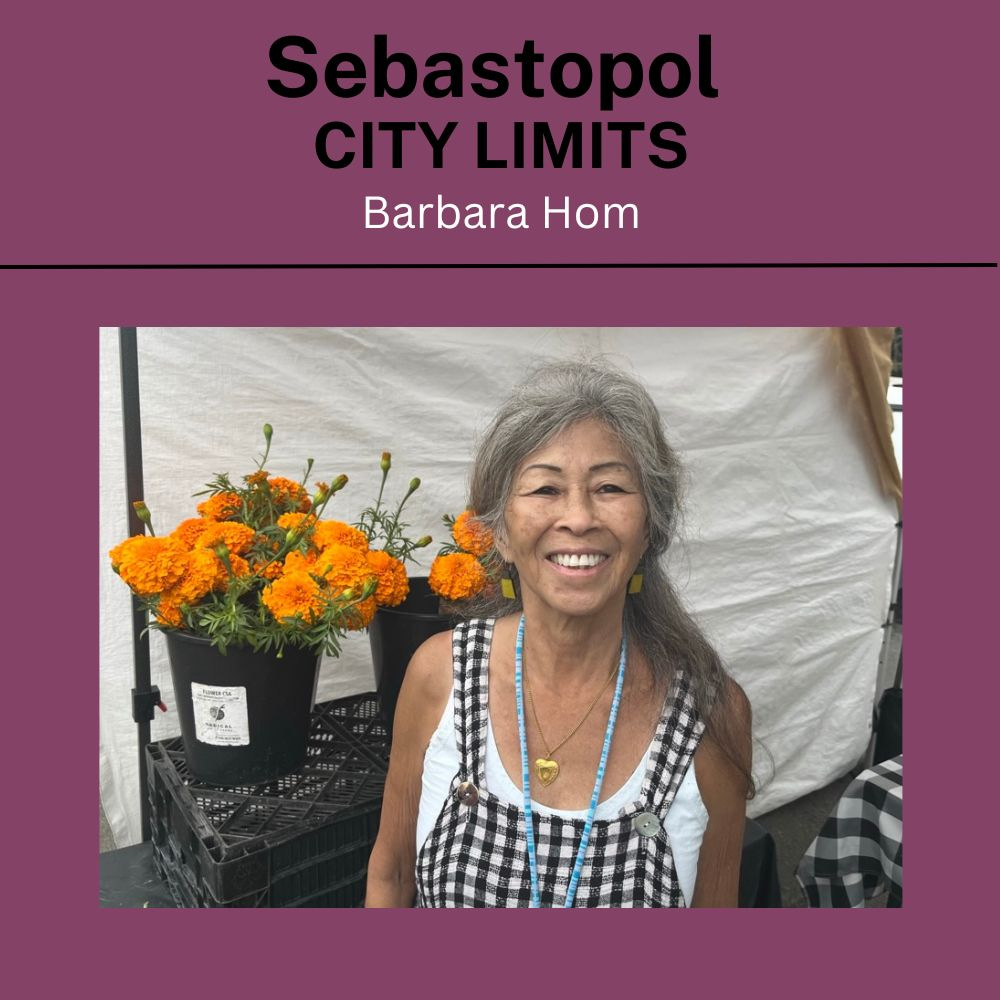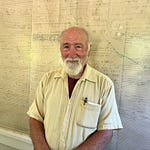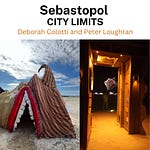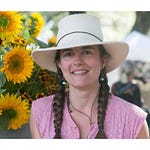It’s easy to take the Sebastopol Farmers Market for granted after 30 years. For some, it’s a Sunday morning ritual to stroll through the market and get whatever is in season. Since the pandemic in particular, some might have gotten out of habit of going regularly to the Farmers Market. Barbara Hom, the new market manager of the Sebastopol Farmers Market is doing all that she can to get you to come back. She also wants to attract young families who are new to the area.
Barbara once was the general manager of the Culinary Institute of America in St. Helena and she continues to work as a chef at local wineries. As some farmers have stopped farming or retired, Barbara is also working to identify new farmers such as Leslie Wiser of Radical Family Farms who specializes in Asian vegetables, which Barbara particularly likes. She recognizes that farmers work hard and struggle to make a living and that there are those who struggle to afford the fresh produce at a farmers market and need assistance.

She was recruited to run the Sebastopol Farmers Market and revitalize it after Covid. (The longtime manager of the Sebastopol Farmers Market, Paula Downing, passed away recently. See her obituary here.) She admits that she’s had a big learning curve and faced a lot challenges. Barbara’s main goal is to keep “the energy of farmers market” running year-round (“rain or shine”). She’s invited guest chefs to come to the market and added more international foods. She’s introduced pony rides and a petting zoo. On the Plaza stage, she has booked a diverse range of musicians throughout the year.
Barbara wants to get people coming back regularly the Sebastopol Farmers Market to once again support local farmers and food makers.


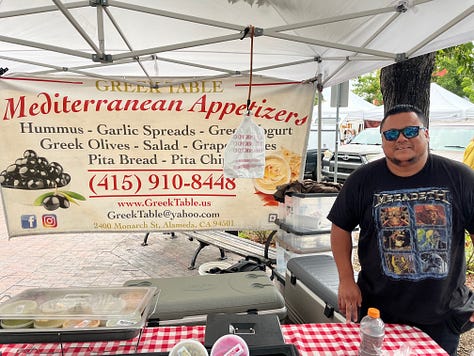
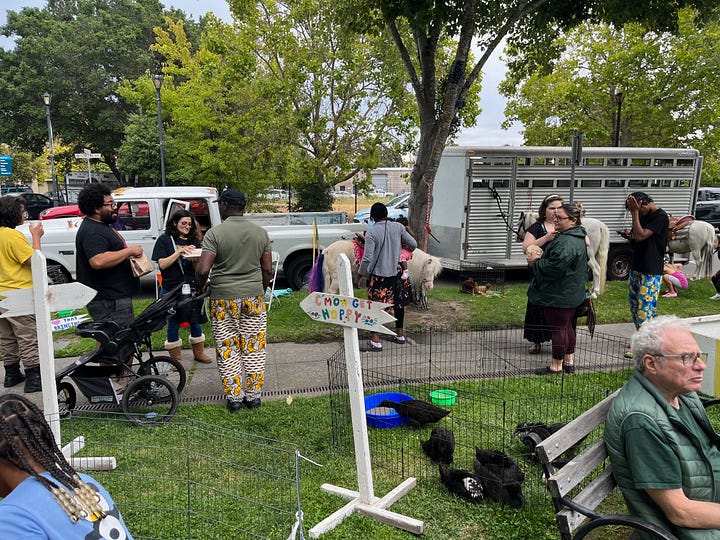
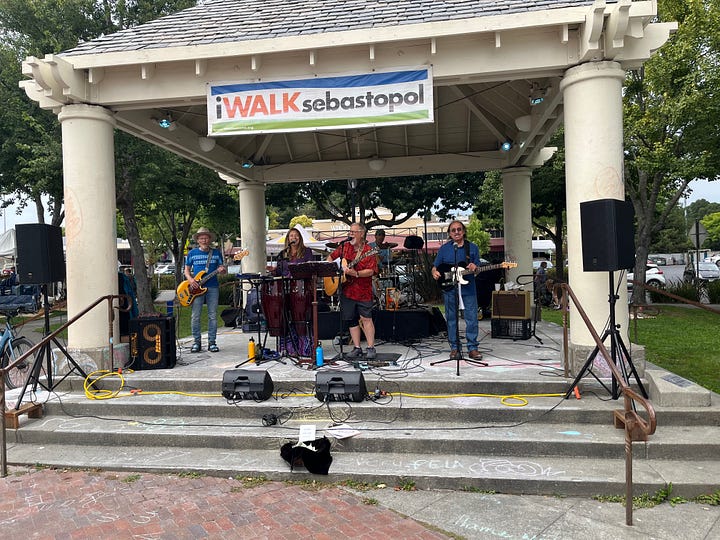
Transcript
Dale: I'm here with Barbara Hom, who's the new market manager for the Sebastopol Farmers Market. Welcome Barbara.
Barbara: Welcome. Thank you
Dale: How long have you been in this new role?
Barbara: Just since last October.
Dale: What do you see that we don't see in the farmers market?
Barbara: I guess part is trying to keep it consistent to have the same farmers come, how the weather really impacts whether they show up either in the beginning of the season or even for that particular day.
Dale: And how consistent is the the number of farmers, meaning the same ones showing up week to week?
Barbara: Right now, we have about somewhere between 25 to 30 farmers. I would say 18 to 20 of them that are year-round. So the other ones, only because the product they have is seasonal, for instance, peaches.
Dale: Tell me a bit about yourself. How did you get into managing a farmers market?
Barbara: Oh, it's it's long story. I'm mainly a chef. I still am a chef, and I've done a lot of consulting and organizational (work). My past big job, I was the general manager of the Culinary Institute in St. Helena.
Dale: Oh.
Barbara: So I've had a lot of food background. My ex, the farm that I live on in West Sebastopol, my ex was was one the first C.O.F. Certified farmers in Sonoma County.
Dale: That means organic, right?
Barbara: Yes. That was about 30 years ago. I've been a customer at the farmers market for 30 years. I'm a longtime resident, and so they called me up. They were having a lot of management changes and they called me up. They recruited me.
Dale: So what kind of challenge did you walk into then? What had to be done?
Barbara: I really had a lot of. challenges because this was kind of post pandemic and the previous two managers were working with pandemic-era rules and regulations, farmers and things like that. The transition was not smooth. When I got the job, I literally inherited or received no training. As I have never run a market before, it was a big learning curve for me.
Dale: Do you think the market was doing well at the time or did it have some issues?
Barbara: I think it was at at a low point. I remember coming to the market years ago when it was really thriving under Paula Downing who sad to say recently passed.
So trying to revitalize the market and get people to come back, get people to feel safe in that shopping circumstance and to bring on new farmers and new booths. Because my background in food, I was able to recruit some really interesting new vendors.
Dale: Tell me about them.
Barbara: Actually there was, prior to me, Radical Family Farms, which just really excites me because they have beautiful Asian vegetables, which I'm an Asian cook. So love the Asian vegetables.
Then getting handmade pasta that's fresh, that is made that morning. Woodland Charcuterie that is just, is amazing. Does Mortadella that just like the old school that is so good and the patés.
Also a lot of the farmers from the past have, because of Covid, changed professions or they've retired. They've gotten older. And so trying to get fresh young farmers back in, so we just got Tuki farms, the Stony Point strawberries. And then a lot of new food booths, processed food booths.
The main change that I've made is that the parking lot around the the plaza, I've turned that strictly into farmers and I've moved all the processed foods like the bakery and the pasta and the meats into the plaza.
Dale: So the line is clear.
Barbara: That's also a California Dept of Food and Ag (regulation) that that they should be separated and they weren't separated. I decided I'd close off off that parking lot except just just for farmers. I could bring new farmers in, have more space.
Dale: So did you say there's about 25 farmers on a given weekend? How many are from within the immediate area of Sebastopol?
Barbara: I'm looking at the list. I would say about half of them are. Then maybe another 25% are Sonoma County. Then maybe a 25%, a little bit like up in the Sierra Foothills. And in the Central Valley.
Dale: How do you think farmers are doing, with Covid and then post covid maybe? One of the ideas of a farmers market is to help sustain local farmers. Are they doing okay?
Barbara: They're having a hard time. Number one, the weather with all the climate changes. It was our peach guy just came back last late in August. I expected them in the beginning of July. The fruit is ripening late. Some of them, apparently, they had rains early in the year when the fruit was just starting to set, so they're not growing properly. Cost of labor is hard. A lot of them are family-run farms and their kids don't want to farm. Having to pay labor is hard.
They're really struggling and people complain about the prices, but it is what it is. They have to make a living. These farmers, some of them work16-hour days, really like Laguna Farms, Nicasio and his family. They work 16-hour days, five or six days a week.
Dale: Do they have other outlets locally to be able to sell their goods?
Barbara: What they do is they do the round of farmers markets. So they could be in Santa Rosa Farmers Market on Saturday, mine on Sunday, and a lot of them do CSA boxes.
Dale: Given your cooking background and as a chef, is there anything you're going to do to bring more food makers to the farmers market?
Barbara: I called on all my friends and have had guest chefs this whole summer. I've had John Ash come. I've had Daniel Kaden that used to be at Backyard, and he's now an instructor at the CIA. I'm gonna have a dumpling demo in a couple weeks. So I'm trying to revitalize the market and also to to make it more family oriented. So now I have pony rides and petting zoos.
I think in two weeks. I'm finally going to get a seafood booth. That has been a struggle, but we're finally gonna get seafood here in Sebastopol.
Dale: From where?
Barbara: From Santa Rosa Seafood.
Dale: Music's another thing that is part of the schedule.
Barbara: I have weekly music. I've booked out for the whole year and we have good music. We've had Hawaiian music; we have Brazilian music. We try to make it a nice place for a family to come. We have some really good food booths. We have a Peruvian empanada and we have Lata's booth that does Indian food and we have sushi. More international.
Dale: So a little bit more flavor, huh?
Barbara: Yes. And the main difference with this market than some of it is we're year- round though and trying to keep that energy year-round is what I've been trying to do.
Dale: Can I ask you, is this a full-time job for you or is it one of many jobs for you?
Barbara: It's one of many jobs. So I'm still chef’ing winemaker dinners. I mainly work for wineries.
Dale: Very good. Again, the Farmers market is open from --
Barbara: 9 am to 1:30pm Sunday year-round in the Plaza.
One of the things that I would like to point out is we really try to help people that are food insecure. I've been getting all this funding to supplement people's income and that has been a large part of my job. Food stamps and try to expand their buying power at the market. Matching money for them. I have an information booth there and if they find me, maybe we can help out is what I wanna say.
Dale: Alright, thank you very much.
Barbara: Okay. Bye.

